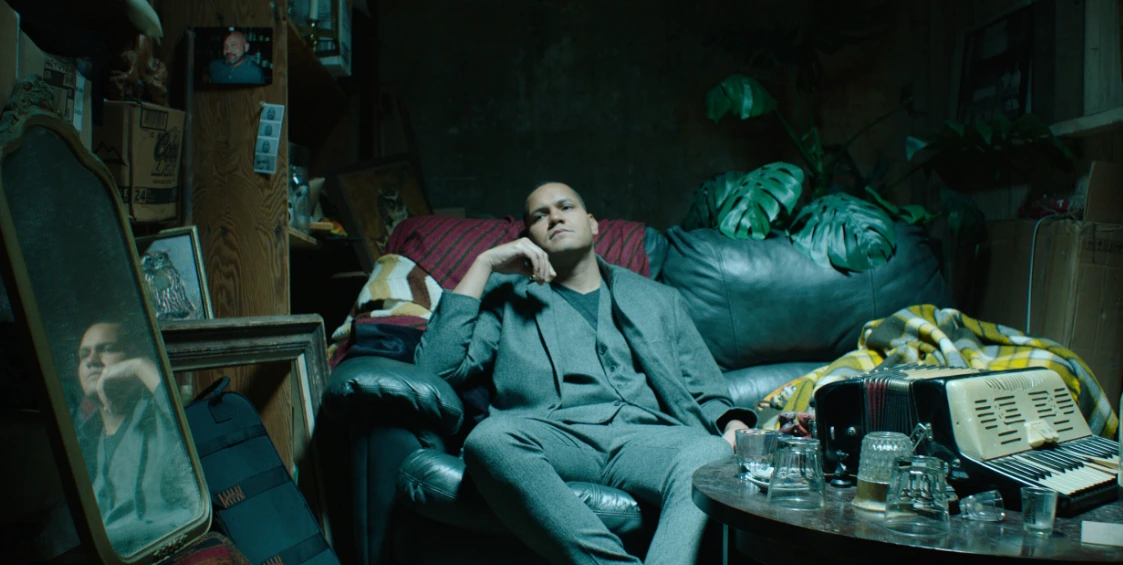
Film Review: Thin Skin
Film Reviews
Thin Skin
Director: Charles Mudede
Pressing Pictures, True Productions
Released in Theaters: 11.16
It’s not often you see someone play themself in a film. It’s even rarer to see someone play themselves in a vulnerable narrative such as Thin Skin, directed by Charles Mudede and written by Mudede featuring star/subject Ahamefule Oluo and Oluo’s wife Lindy West (Shrill).
In the film, the character of Aham (Oluo playing himself) is a single dad stuck in a rough period of his life. He’s recently divorced, living at his sister (Ijeoma Oluo playing herself)’s house along with his mother (played by actress Annette Toutonghi) and makes his living out of an awful, corporate cubicle. The only real escape he finds is through his music as he spends nights playing trumpet in a local club. Things become even darker for Aham when he learns of his estranged father’s passing and is diagnosed with a severe skin condition called toxic epidermal necrolysis.
In 2023, the real-life Oluo is a successful musician, composer, writer and stand-up comedian who first tackled the story told by Thin Skin in a 2014 stage production that mixed his experimental music compositions, stand-up comedy and writing skills into an autobiographical opera called Now, I’m Fine.
All of those same elements Oluo put into the stage production are transposed to the film version to an extent, but the music naturally stands out. The sequences in which Aham is playing trumpet are gorgeous and evocative of the freedom and expression he feels, whether he’s playing on stage or practicing in a park that overlooks the gloomy Seattle skyline.
The film is full of smooth pans and locked shots that keep the film feeling grounded, but other than that, Mudede’s direction doesn’t stand out so much as the story, which he, Oluo and West wrote. For example, the unsettling sequence when Aham’s body is fighting his condition and he must prevent his lips from fusing together is indeed unsettling, but it’s more conceptually unsettling than visually. The most interesting visual concept in the film is a dream sequence near the end, in which Aham sees what’s to come: Aham walks through a forested lobby and into a theater where he watches himself conduct, a vision of his own personal future. It’s a powerful moment that’s helped by the choice to light the forest-walk like it’s on a stage, as well as the choice to obscure a visitor that Aham sees in the theater.
The performances range widely, from Oluo’s friend and fellow comedian Hari Kondabolu’s awkward performance to Toutonghi’s delightful performance as the Oluo siblings’ mother, playing both sincerity and blissful naivete at the perfect pitch. Oluo’s as himself feels a little uneven as it walks the line between stiff and realistically dry, but again, his skill at the trumpet and the overall success of the script makes that forgivable.
Thin Skin is well written, juggling heavy themes such as grief, depression and white privilege within a mixed-race family. Particularly impressive is how it supplements these themes with laugh-out-loud moments. (One particular exchange with a bank employee made me guffaw, and I don’t use that word lightly.) The ending concert Aham sees in his near-death dreamscape is immensely powerful, and I wish I could have seen it in the original stage production.
Despite a few weak performances, Thin Skin soars where it counts and paints a picture of an artist on the rise despite the pain of the darker sides of life. –Max Bennion
Read more film reviews on gritty dramas:
Film Review: May December
Film Review: The Marsh King’s Daughter